- Home
- Tony Abbott
Lunch-Box Dream Page 10
Lunch-Box Dream Read online
Page 10
I turned to her. “I can’t sing. I won’t sing. Don’t ask me to.”
“You better do something. Your wife needs to hear from you, and if it won’t be talking, it better be singing.”
Momma Ruth put her eyes on me and wouldn’t take them off me. She was steaming. I didn’t know what to do. I didn’t want to talk. I was so mad. I was still shaking from the bus station. That man who struck my hand from that doorknob. And me thanking him yes, sir, yes, sir, and wanting to kick him till he didn’t move.
“Damn Jacob’s whistling and his gawking! He’s just a damn boy who should have known his place—”
“Shut your mouth!” Ruth said, closing her hand on my lips.
I pushed it away. I knew it was Frank who had allowed it to happen. He always did things wrong. He messed things up. Or maybe it wasn’t Frank, but I had to be mad at somebody and he was easy to be mad at, and then I regretted thinking that. I hoped against everything that Jacob was not in a ditch by some road, but I kept seeing that open box, and his little dead face in it, and my heart shook with crying. I tried not to do it out loud but Momma Ruth knew what was going on in me.
“Stop that now,” she said, patting my hands. “We’re waiting.”
That bus was quiet! No one saying a word.
I went in my head through all the songs I knew and they wouldn’t work except in a jook house, until I went back to when I was a boy. In my head I heard some words from a long time ago. I didn’t know how right they were, but I started humming the tune, then I spoke out the words I remembered. When they all started coming back to me, I sang them, but low at first.
Life crushes me with burdens
I tremble, stumble down
My Lord, He lifts my head up
There to set a starry crown.
Thirty-Two
Bobby
How after all that, Bobby had gotten an empty seat for just himself, he didn’t know, but he sat leaning against the window, and saw for the first time a small sign over the seat two rows ahead of him. It read: colored. It took him a moment to realize that it probably said white on the other side, and that he, Ricky, and his mother were in the the colored section.
He turned his head slightly. The young woman was bent over, fussing with the older one’s bags. Her hands trembled and quaked as if she was sick. Her face wouldn’t stop being wet. The older man had his hand on her shoulder, patting it.
Bobby was damp all over. The dusty-hot streets, the window heat, the noon sun coming from straight up there, from the crest of the sky, moving its whiteness along the aisle floor whenever the bus turned. He hated filthy dusty Atlanta, its crawling traffic, he hated the South, hated himself, wanted not to be in his own skin anymore or be anywhere at all. But here he was in the suffocating heat of a slow-moving iron box. All around him the passengers were hushed. No one spoke except in whispers, probably about what had happened at the station, all of which made it easy to hear when one of the men began to hum, then hum with his mouth open, then sing.
Our journey may be weary
Our ride to heaven long
The driver glanced up into the mirror and asked him to please quiet down, and the brown man did for a while, but his voice grew louder once more, as if he couldn’t help it, and this time the driver said nothing.
There was something about the way the man sang that was full of pain, like tugging raw nerves out of the dirt. His voice coiled and twisted, lingered on a word, stopped short, then came up again. Soon, the other brown people began talking while he sang. Or, not talking, but humming along or speaking out isolated words that may or may not have been the words to the song.
Bobby leaned forward and whispered, “What’s it all about?”
His brother’s face was pressed to the window ahead of his. “I think somebody died. Probably somebody they know died.”
When Bobby glanced over his shoulder, the singing man’s eyes were closed, with the young woman’s head bent to his shoulder, her cheeks still wet behind a handkerchief. The song was about burdens and crushing and resting and dying, and his chest felt both hollow and full at the same time and he wanted to cry, too. What was going on?
Had someone really died?
He decided someone had died.
So it was with him wherever he was. He began to feel as if, no longer the death train or the death car, now the bus carried a coffin among them. It rumbled down the road, looking like a bus, squealing and stirring up dust like a bus, but was not a bus, for inside it a box draped in bunting and black crape was rising from beneath the floor of the aisle, up and up, until it stopped between the seats for all to see. Who was inside? Not Lincoln. Not his grandfather. Then who? Whose casket was it?
And the song went on.
Lord, leadeth me unto my throne
Where I shall rest when day is done
The man’s voice washed over the death box like a wave taking all of them with it, from the backseats where they sat, up to the front, including the driver, who said nothing even though the sound was louder than ever. Bobby’s eyes stung with the idea that this brown family, who had nearly been refused seats on his bus, was approaching in the town of Dalton a death that they dreaded so deeply but just as deeply could not avoid.
His chest was a thing of lead. The coffin lid pressed heavily on it. And the song went on and on.
Our journey may be weary
Our ride to heaven long.
Thirty-Three
They drove all the roads to Dalton listening to that song, then to a second one that sounded much like it, then to none at all, the not-sound of which was like its own song rolling and rolling.
In that silence that wasn’t silence, the fantastic coffin kept growing. It grew larger and larger until it took up the entire bus and they were all inside it, the not-song washing over them and over them. Bobby couldn’t breathe, the way you can’t breathe when your head is out the car window and the air pushes into your nose and suffocates you.
Ricky said nothing. Their mother was in her own place now, private and shadowed, the olive circles under her eyes as dark as Bobby had ever seen them. The bus rolled along the road neither too slowly nor too quickly, but gravely and with respect for the realities of street traffic, like its own funeral procession, a coffin on wheels rolling correctly road to road in the oppressive heat.
Almost two hours after the bus started, Bobby saw the town sign: DALTON, 3 MI.
A sharp yell from behind him and the tumbling of heavy bags.
“Hold your horses back there,” the driver rasped when both women jumped up from their seats and the young one came a few steps up the aisle and halted next to Bobby’s seat, hunched over and searching with her eyes out the windshield. He smelled the smell of laundry detergent from her dress. Her hand was on the seat back in front of him.
“Down, please,” the driver said, slowing. “Sit down.”
The women didn’t sit but clung to the seat backs, which the driver saw in the rearview mirror, but he didn’t say anything else. It was the same as when he told the man to quiet the singing. They didn’t sit, as if they couldn’t sit, like Ricky didn’t sit, and the driver didn’t say any more.
The young woman’s hand didn’t move from the seat rest, inches from Bobby’s face. She couldn’t have been very old. Her hand was smooth and small and holding tightly to the iron bar of the seat back.
He thought of the ash can his mother had crumpled and the ash cans on his street in Cleveland and the hands of those men and the hand of this woman and he thought of the word, that word, and was ashamed of it.
He felt his chest heave and his throat sting and his own hand move—his hand, with its knuckles still nicked from scraping sticks. He watched his hand move, cross up before his eyes to the woman’s hand. He watched it settle over her warm fingers lightly, like a cloth settling over them. She looked down at him and his hand with surprise, her lips opening, but she did not remove her hand from under his. He molded his little white fingers to the shape of
hers, but lightly, searching her face to see if she was already changing, the way he worried his mother had changed when his grandfather had died. Her eyes looked on him, wide and open. He couldn’t tell what she was thinking, but he did not move his fingers. He knew Ricky was staring at him and at his hand, but he could not take it away.
There was a sound ahead, a yell or a call, and the bus jerked. Bobby’s hand was still on the young woman’s. It was there for a minute, perhaps two, until the bus jerked again, and she softly withdrew her fingers, meeting his eyes again for an instant, then twisting her face in a gasp at what she saw out the windshield.
Peering to the front now, Bobby saw two police cars, black-and-white sedans, parked at angles, with a red fez light on each roof, but not flashing, and their sirens silent. The older woman standing behind the younger one groaned, fell to her knees in the aisle, and started to cry. “Oh, he’s gone!” When the bus wobbled up to the brick building, Bobby saw on his right a brown woman appear in the open doorway from inside the station, her wide-eyed look jumping from one rear window to the next. She met his eyes for an instant, too. Her face was wet, she was heaving, sobbing, barely able to stand, and his chest throbbed.
“Oh, my God, it’s Olivia!” said the man who had sung.
Out of the dark station doorway came a man who so looked like the singing man on the bus it could have been his twin. He clutched the woman’s shoulders, also searching the bus windows one after another, also crying.
Behind Bobby, the whole family was in the aisle now, sobbing out a jumble of voices. The bus slowed to a crawl. Two police officers stood next to the black couple on the platform, their faces unseen in the shadows of their hat brims.
The young woman next to Bobby sank to her knees and wailed. The man with the hat bent to her, making sounds in his throat. Bobby smelled him, too. He smelled the same as his own sweat, sour and afraid.
The instant the bus stopped at the curb, the family lurched for the door to get out before anyone else. All the white people stayed in their seats, as if strapped to them. The older woman left her bags on the floor below the seat, yelling at the top of her lungs.
Then the woman on the platform outside started shaking her head. “No, no, no!” she sobbed. Then there was movement behind her, and an older black woman with gray hair appeared on the platform with her arms around the shoulders of a young boy.
The boy wobbled in the darkness of the doorway. When the bus door gasped open, he raised his head at the young woman stumbling down the steps. His face was streaming as wet as hers.
“Oh, my God!” the young woman cried. “Jacob! Jacob! Jacob!”
“It was Frank—” someone called out.
The boy’s face crumbled when he ran to the young woman whose hand Bobby had touched. Screaming, she flew to him at the same time and wrapped her arms around him and pressed him into her as if to never let him go.
“Frank found him,” someone said. “He searched and searched. He was lost, just—”
“Ja—cob! Ja—cob!” the older woman screamed now from the bus steps, falling to her knees in the dusty road, while the older man behind her nearly tripped onto the sidewalk, then bent down to help her to her feet.
“Jacob—” The younger man leaped out the door in a rush, falling onto the sidewalk. His hat rolled off in a wide half circle. It seemed as if he fell on his face, but he picked himself right up and lunged to the station’s open doorway.
The young woman sobbed—“Jacob! Jacob!”—melting again and again into his little arms and she and the boy faltered, but the hatless man was there to hold her up, hold them both up, his chin shaking like hers and the boy’s. The three of them wrapped themselves together in a moving ball of brown faces and arms.
The two white boys and their mother and everyone watched from their seats on the bus, saying nothing.
Also saying nothing, the driver made his way down the aisle checking left and right. He carried the forgotten bags to the front, then handed them down, stood back on the bus steps, and watched the scene unfold on the station platform.
It went for minutes like this before the driver settled himself into his seat again and, checking his watch and looking in the mirror at the passengers, pulled the knobbed arm that closed the door with a hush, then threw the bus into gear. It shrieked and coughed a cloud of gray smoke over the sidewalk and began to move.
“Chattanooga next,” he said. “Thirty-five minutes.”
Ricky removed his glasses and pinched his eyelids shut. “I can’t wait to be home.”
Bobby said nothing while the wailing from the station continued to bubble in through the windows. His heart pounded against his ribs as the wet faces and arms wrapped around one another. Not able to take his eyes from them, he watched them teeter together on the platform, watched them stumble step by step together into the shadow of the station doorway, and watched them still as the bus drove up the long street, rolling heavily through the dust, until it turned the corner and, huffing for breath as if breathing was no longer possible, he couldn’t see them anymore.
Also by Tony Abbott
Firegirl
The Postcard
Author’s Note
This story began with memories: my grandmother, mother, brother, and I did take such a battlefield tour in June 1959, and we witnessed several instances of Jim Crow in action, both among ourselves and more publicly in the South. Many parts of this novel are reflections of that trip. Since, however, my memories formed only a fragmentary narrative, other parts of the present story are necessarily fictional.
The system of racist customs and laws known as Jim Crow existed in varying degrees in the Southern states from roughly the fall of Reconstruction in 1877 to the Civil Rights and Voting Rights acts of 1964 and 1965. It was, in effect, a continuation of the slavery that had been abolished by the Emancipation Proclamation in 1863 and over which the Civil War had been fought. Jim Crow, named after an early nineteenth-century minstrel song, was pervasive, a way of life that governed every public action of African Americans in the South. They were not allowed to mix with whites in restaurants, railroad cars, buses, waiting rooms, theaters, restrooms, water fountains, parks, and pools. Factories, stores, banks, and other institutions had elaborate rules governing the intermingling of the races.
The realities of life under Jim Crow have been well documented, and some recent and widely available books include Sons of Mississippi, by Paul Hendrickson; The Race Beat, by Gene Roberts and Hank Klibanoff; The Promised Land, by Nicholas Lemann; Trouble in Mind, by Leon F. Litwack; and There Goes My Everything, by Jason Sokol. An essential volume of oral history transcripts (and audio recordings) of victims of the period is Remembering Jim Crow, edited by William H. Chafe, Raymond Gavins, and Robert Korstad, among others. Sweet Land of Liberty, by Thomas J. Sugrue, addresses, as its subtitle states, “the forgotten struggle for civil rights in the North.” Richard Wright’s 1937 autobiographical sketch, “The Ethics of Living Jim Crow,” has not been surpassed.
In Lunch-Box Dream, Hershel Thomas refers several times to the 1955 killing in Money, Mississippi, of fourteen-year-old Emmett Till. Emmett lived in Chicago and was visiting relatives in Mississippi when he allegedly whistled at a white woman. He was later kidnapped and his body recovered in the Tallahatchie River, identifiable only by his ring. To document the brutality of his murder, Emmett’s mother displayed his body in a glass-topped coffin and allowed now-famous images to be published in Ebony magazine. By their own later admission, the white woman’s husband and a relative had in fact killed Emmett, but had already been acquitted by the (usual for the time) all-white jury. The publicity surrounding Emmett Till’s death, his funeral in Chicago, and the subsequent trial in Mississippi, strengthened immeasurably the civil rights movement in both the North and the South.
As a side note, Emmett’s coffin was rediscovered in 2009 in a shed at the Chicago cemetery where he was buried and is now in the possession of the National Museum of African American History
and Culture in Washington, D.C. Further information about the shotgun death Hershel refers to in chapter 26 can be found in the Atlanta Journal-Constitution from that week in June 1959.
I want to thank several friends who read this story at various times in its development and who offered many insightful comments and comfort, too: Nora, Elise, Dennis, Pat, Tami (thanks, also, for the photo of El Siesta), Karen, and Floyd. Thank you to Sarah Salomon, whom I do not know but who read the manuscript at a crucial stage. From the very beginning of my work on this book, my wife, Dolores, has been my conscience, inspiration, and sounding board. I am as ever grateful to my unstoppable agent, George Nicholson, for just that, not stopping until he found the perfect editor—Frances Foster, whose intelligence, grace, and imagination at our first meeting told me my story had found its true home. Every encounter since then has been a joy. Thanks are due also to Susan Dobinick, whose careful shepherding of the manuscript has made me long to stay at that new home for a good while to come.
Excerpt from “Lunch in a Jim Crow Car” from Selected Poems of Langston Hughes by Langston Hughes, copyright © 1959 by Langston Hughes and renewed 1987 by George Houston Bass. Used by permission of Alfred A. Knopf, a division of Random House, Inc., and by permission of Harold Ober Associates Incorporated.
“Kansas City”: Words and Music by Jerry Leiber and Mike Stoller.
Copyright © 1952 Sony/ATV Music Publishing LLC. Copyright Renewed. All Rights Administered by Sony/ATV Music Publishing LLC, 8 Music Square West, Nashville, TN 37203. International
Copyright Secured. All Rights Reserved. Reprinted by permission of Hal Leonard Corporation.
Copyright © 2011 by Tony Abbott
All rights reserved
mackids.com
Library of Congress Cataloging-in-Publication Data

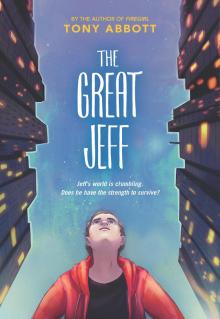 The Great Jeff
The Great Jeff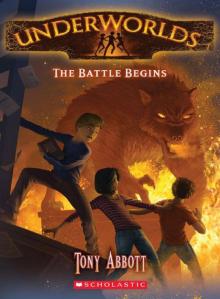 Underworlds #1: The Battle Begins
Underworlds #1: The Battle Begins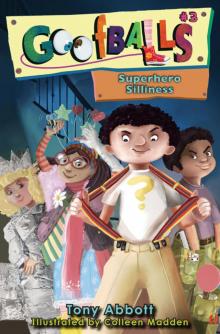 Superhero Silliness
Superhero Silliness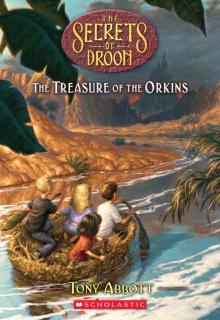 Treasure of the Orkins
Treasure of the Orkins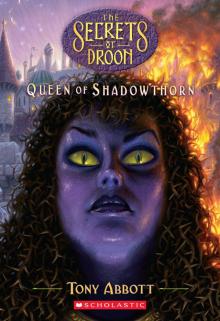 Queen of Shadowthorn
Queen of Shadowthorn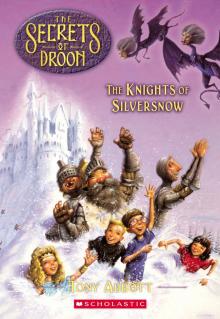 The Knights of Silversnow
The Knights of Silversnow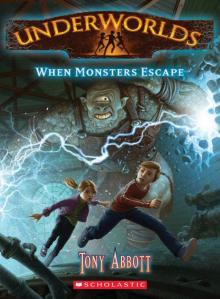 Underworlds #2: When Monsters Escape
Underworlds #2: When Monsters Escape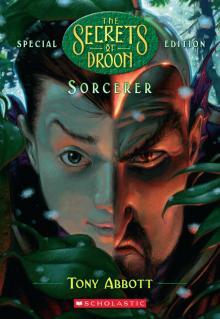 Sorcerer
Sorcerer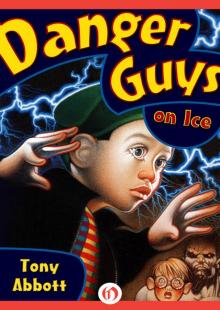 Danger Guys on Ice
Danger Guys on Ice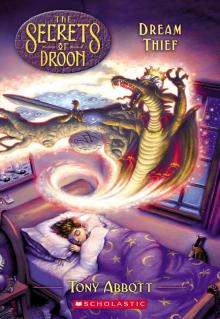 Dream Thief
Dream Thief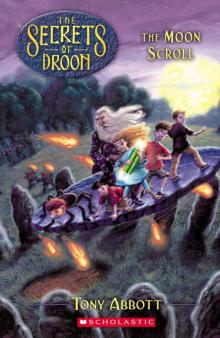 The Moon Scroll (The Secrets of Droon #15)
The Moon Scroll (The Secrets of Droon #15)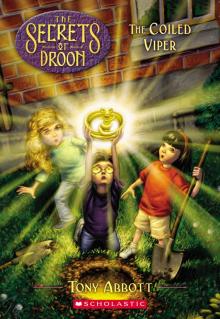 The Coiled Viper
The Coiled Viper Pirates of the Purple Dawn
Pirates of the Purple Dawn What a Trip!
What a Trip!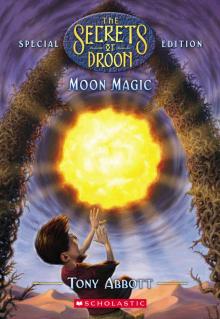 Moon Magic
Moon Magic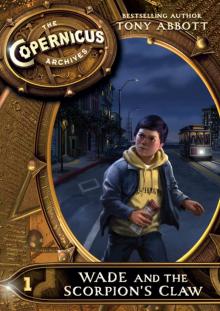 Wade and the Scorpion's Claw
Wade and the Scorpion's Claw Incredible Shrinking Kid!
Incredible Shrinking Kid!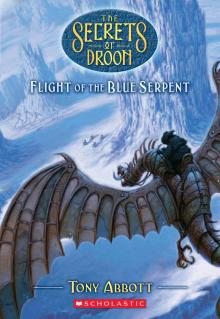 Flight of the Blue Serpent
Flight of the Blue Serpent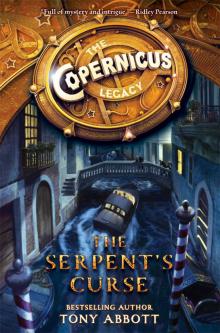 The Serpent's Curse
The Serpent's Curse Gigantopus from Planet X!
Gigantopus from Planet X!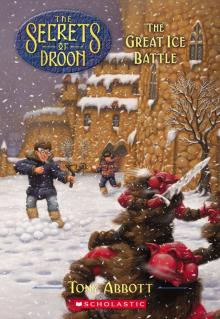 The Great Ice Battle
The Great Ice Battle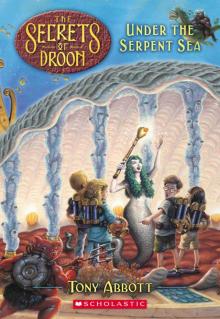 Under the Serpent Sea (The Secrets of Droon #12)
Under the Serpent Sea (The Secrets of Droon #12) The Riddle of Zorfendorf Castle
The Riddle of Zorfendorf Castle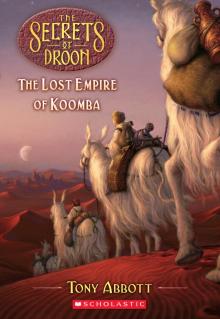 Lost Empire of Koomba
Lost Empire of Koomba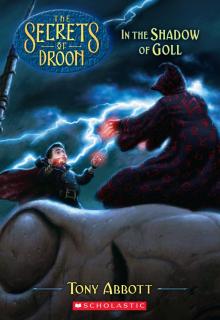 In the Shadow of Goll
In the Shadow of Goll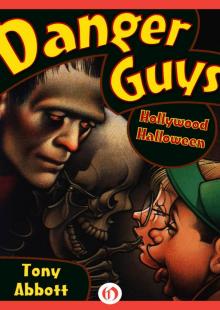 Danger Guys
Danger Guys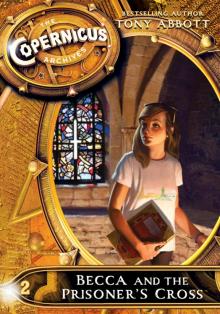 The Copernicus Archives #2
The Copernicus Archives #2 Lunch-Box Dream
Lunch-Box Dream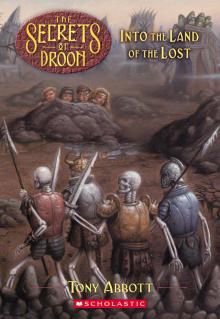 Into the Land of the Lost
Into the Land of the Lost Cosmic Boy Versus Mezmo Head!
Cosmic Boy Versus Mezmo Head! The Crazy Classroom Caper
The Crazy Classroom Caper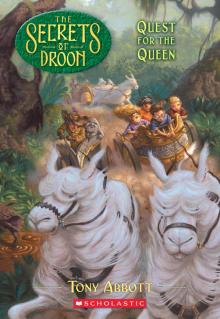 Quest for the Queen
Quest for the Queen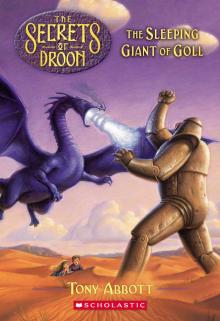 The Sleeping Giant of Goll
The Sleeping Giant of Goll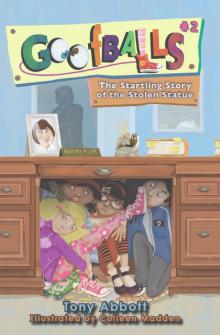 The Startling Story of the Stolen Statue
The Startling Story of the Stolen Statue Brain That Wouldn't Obey!
Brain That Wouldn't Obey!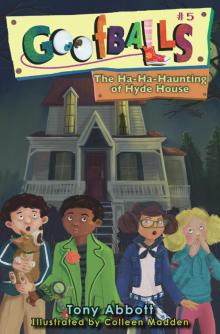 The Ha-Ha-Haunting of Hyde House
The Ha-Ha-Haunting of Hyde House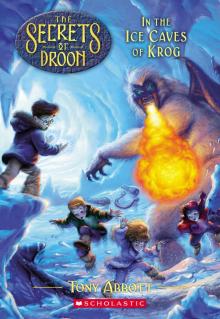 In the Ice Caves of Krog
In the Ice Caves of Krog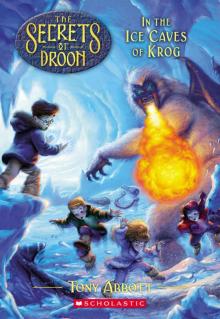 In the Ice Caves of Krog (The Secrets of Droon #20)
In the Ice Caves of Krog (The Secrets of Droon #20) Beast from Beneath the Cafeteria!
Beast from Beneath the Cafeteria!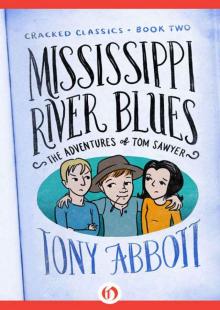 Mississippi River Blues: (The Adventures of Tom Sawyer) (Cracked Classics, 2)
Mississippi River Blues: (The Adventures of Tom Sawyer) (Cracked Classics, 2)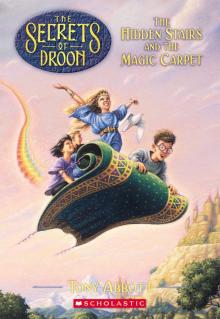 The Hidden Stairs and the Magic Carpet
The Hidden Stairs and the Magic Carpet The Mysterious Island
The Mysterious Island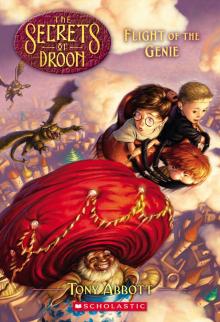 Flight of the Genie
Flight of the Genie Voyage of the Jaffa Wind
Voyage of the Jaffa Wind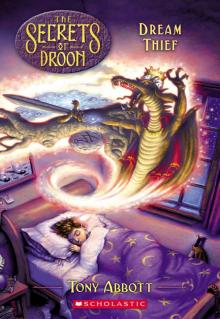 Dream Thief (The Secrets of Droon #17)
Dream Thief (The Secrets of Droon #17) Danger Guys Hit the Beach
Danger Guys Hit the Beach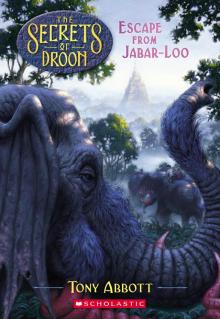 Escape from Jabar-loo
Escape from Jabar-loo Zombie Surf Commandos from Mars!
Zombie Surf Commandos from Mars! Firegirl
Firegirl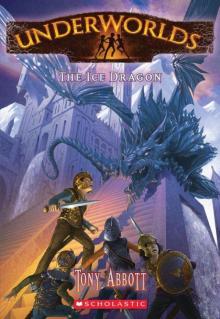 Underworlds #4: The Ice Dragon
Underworlds #4: The Ice Dragon Attack of the Alien Mole Invaders!
Attack of the Alien Mole Invaders!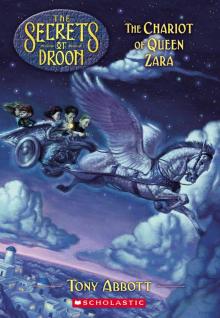 The Chariot of Queen Zara
The Chariot of Queen Zara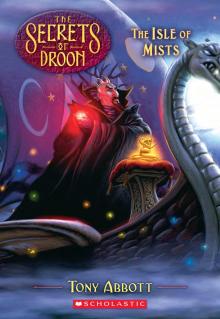 The Isle of Mists
The Isle of Mists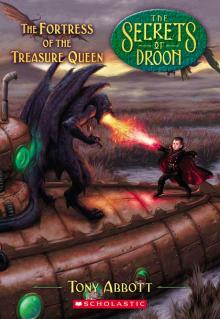 The Fortress of the Treasure Queen
The Fortress of the Treasure Queen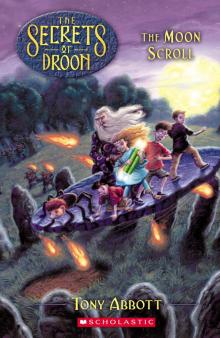 The Moon Scroll
The Moon Scroll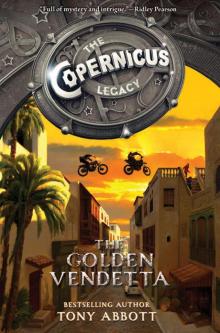 The Golden Vendetta
The Golden Vendetta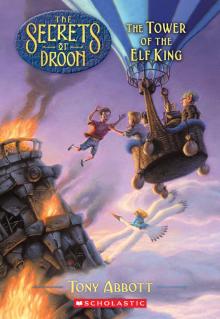 The Tower of the Elf King
The Tower of the Elf King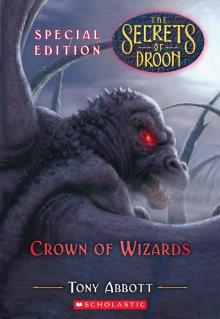 Crown of Wizards
Crown of Wizards Search for the Dragon Ship
Search for the Dragon Ship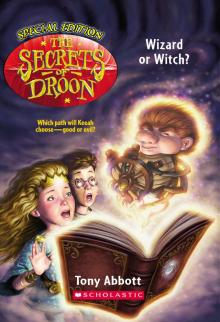 Wizard or Witch?
Wizard or Witch?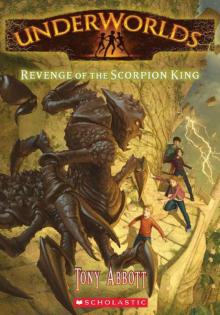 Underworlds #3: Revenge of the Scorpion King
Underworlds #3: Revenge of the Scorpion King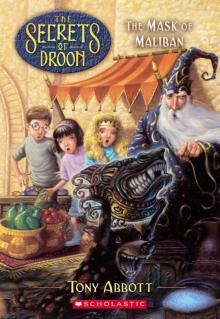 The Mask of Maliban (The Secrets of Droon #13)
The Mask of Maliban (The Secrets of Droon #13) The Summer of Owen Todd
The Summer of Owen Todd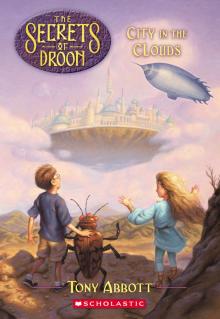 City in the Clouds
City in the Clouds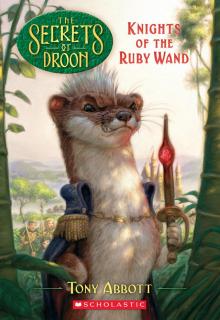 Knights of the Ruby Wand
Knights of the Ruby Wand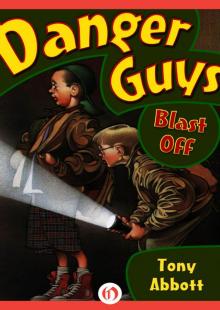 Danger Guys Blast Off
Danger Guys Blast Off Danger Guys and the Golden Lizard
Danger Guys and the Golden Lizard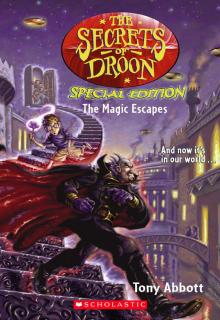 The Magic Escapes
The Magic Escapes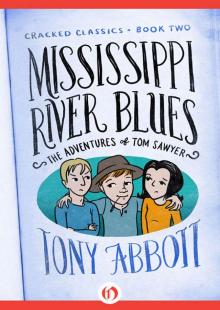 Mississippi River Blues
Mississippi River Blues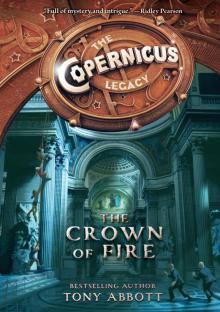 The Crown of Fire
The Crown of Fire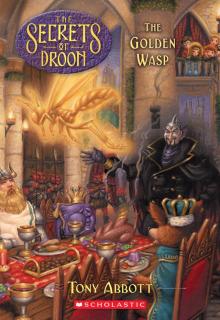 The Golden Wasp
The Golden Wasp Voyage of the Jaffa Wind (The Secrets of Droon #14)
Voyage of the Jaffa Wind (The Secrets of Droon #14) Denis Ever After
Denis Ever After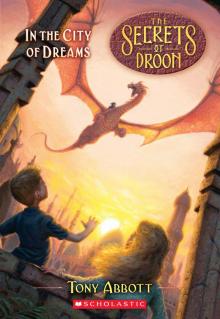 In the City of Dreams
In the City of Dreams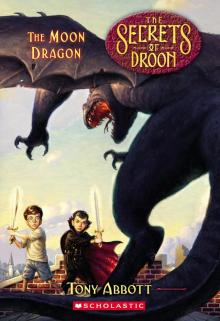 The Moon Dragon
The Moon Dragon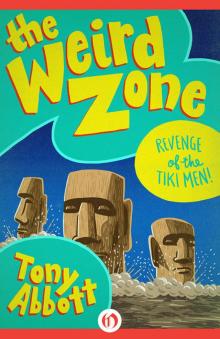 Revenge of the Tiki Men!
Revenge of the Tiki Men!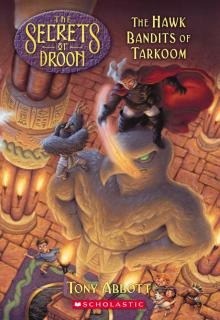 The Hawk Bandits of Tarkoom
The Hawk Bandits of Tarkoom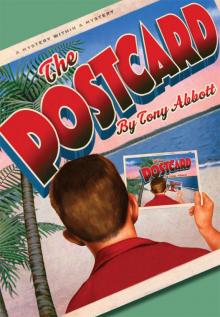 The Postcard
The Postcard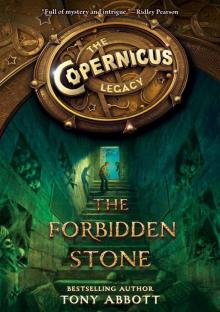 The Copernicus Legacy: The Forbidden Stone
The Copernicus Legacy: The Forbidden Stone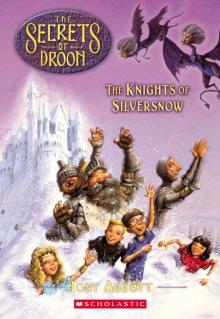 The Knights of Silversnow (The Secrets of Droon #16)
The Knights of Silversnow (The Secrets of Droon #16) Under the Serpent Sea
Under the Serpent Sea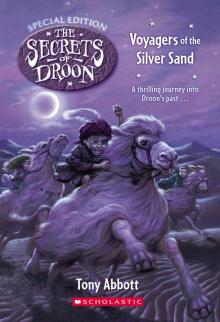 Voyagers of the Silver Sand
Voyagers of the Silver Sand X Marks the Spot
X Marks the Spot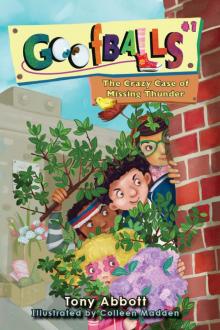 The Crazy Case of Missing Thunder
The Crazy Case of Missing Thunder Journey to the Volcano Palace
Journey to the Volcano Palace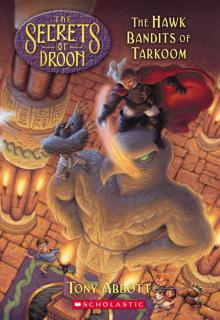 The Hawk Bandits of Tarkoom (The Secrets of Droon #11)
The Hawk Bandits of Tarkoom (The Secrets of Droon #11)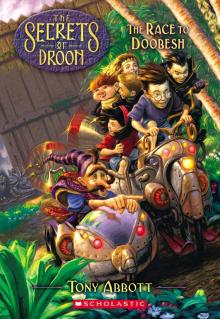 The Race to Doobesh
The Race to Doobesh Trapped in Transylvania
Trapped in Transylvania Humbug Holiday
Humbug Holiday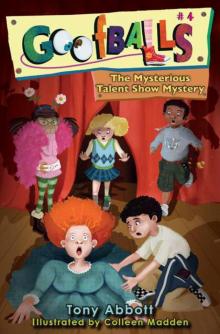 Goofballs 4: The Mysterious Talent Show Mystery
Goofballs 4: The Mysterious Talent Show Mystery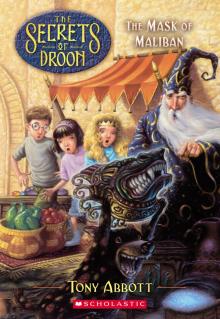 The Mask of Maliban
The Mask of Maliban Final Quest
Final Quest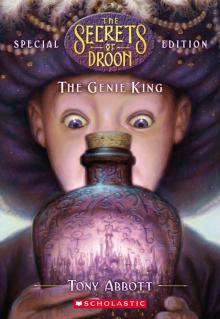 The Genie King
The Genie King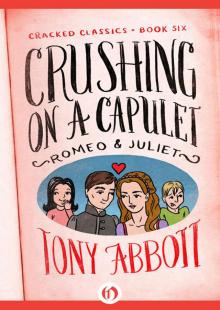 Crushing on a Capulet
Crushing on a Capulet